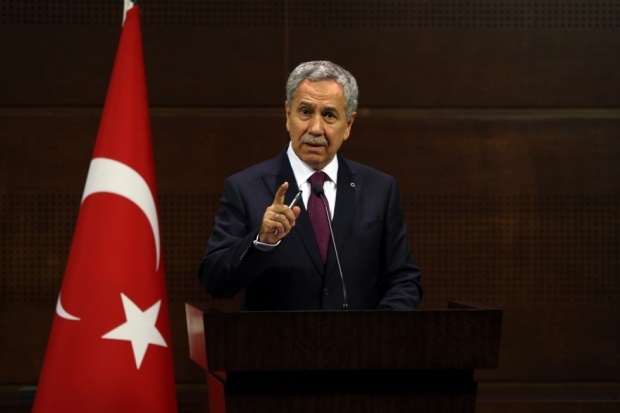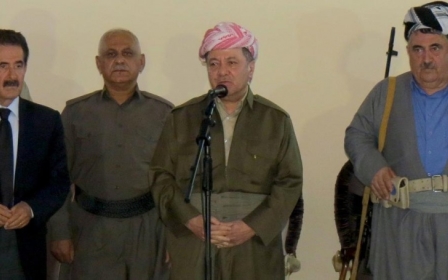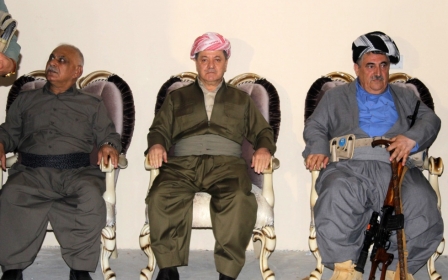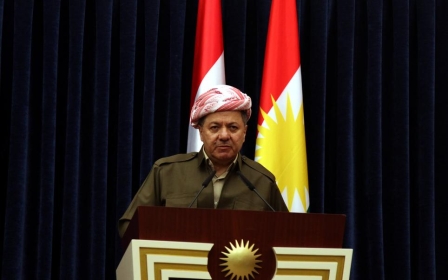Turkey opposes split of Iraq Kurdistan as Israel backs break-up

The Turkish government said on Monday that it was against Iraq's Kurdistan region splitting away from Baghdad, after Sunni militants seized a vast swathe of territory in Turkey's conflict-torn neighbour.
"The government is very closely monitoring the developments in Iraq," Deputy Prime Minister Bulent Arinc told reporters after a cabinet meeting.
"The entire world knows our official view: let Iraq not be split up, let guns not be directed against one another, let people not shed each other's blood, let outside powers ... pull their hands out of Iraq and let Iraq proceed on its path as an integrated society," he said.
Israeli Prime Minister Benjamin Netanyahu on Sunday called for independence for Iraq's Kurdistan region, where Kurdish peshmerga security forces have mobilised to fight against ISIL.
Turkey -- which has its own Kurdish minority -- has traditionally been vehemently opposed to the notion of Kurdish independence.
Yet in recent years, Turkey has built up strong trade ties with Iraq's Kurdistan region and Prime Minister Recep Tayyip Erdogan has moved to satisfy some of the demands of Kurds in Turkey.
In May, Turkey began exporting oil supplies from Iraqi Kurdistan to international markets, drawing the ire of the central government in Baghdad.
But Arinc brushed away the Israeli premier's remarks and insisted that Ankara was committed to the territorial integrity of Iraq.
"There is no doubt that Netanyahu represents his government ... but the fact that he made this comment does not mean that it is going to come true. There is a state in Iraq with its constitution," said Arinc.
Turkey supports the retention of a special status for the oil-rich city of Kirkuk where all local communities - Turkmen, Arabs, Kurds and others can share its resources.
Israel had tried to cement its relations with Iran, Turkey and the Kurdish region in northern Iraq in the 1950’s at a time when Kurds were looking for international support to establish their own state in north-eastern Syria, northern Iraq, north-western Iran and south-eastern Turkey.
The support expressed earlier by Israeli Prime Minister Benjamin Netanyahu for Kurdish statehood reflects his desire to bolster Israel's economic and security ties with the Kurds, an expert in Israeli affairs said Monday.
"This support is also an attempt by Netanyahu to deliver the message that Israel is able to play in the backyards of regional powerhouses Turkey and Iran," Wadie Abu Nassar, a former political science lecturer at the Open University of Israel, told Anadolu agency.
In a Sunday speech at Tel Aviv University's INSS think tank, Netanyahu endorsed the independence of Iraqi Kurds.
"With respect to the Kurds, they are a nation of fighters who have proven they can be politically committed, and are worthy of statehood," he said.
Abu Nassar described relations between Israel and the Kurds as "old," adding that these relations were no secret.
He said that Netanyahu knew well that the interests of both Turkey and Iran would not be served by a strong Kurdish state on their borders.
"At the end of the day, the new Kurdish state will also demand the inclusion of other parts of Syria, Iran and Turkey," Abu Nassar said.
Abu Nassar is the head of the independent International Consultations Centre in the northern Israeli city of Haifa.
He said relations between Israel and the Kurds dated back to the 1950s, but added that they were largely undocumented.
He added that Israel had tried to cement its relations with Iran, Turkey and the Kurdish region in northern Iraq in the 1950s at a time when Kurds were looking for international support to establish their own state in northeastern Syria, northern Iraq, northwestern Iran and southeastern Turkey.
"This attempt, however, did not succeed because Israel had its own calculations at the time," Abu Nassar said.
He said Israel was not ready to lock horns with either Turkey or Iran over the Kurdish issue.
He added that Saddam Hussein's Iraq had prevented Israel from forging a strong alliance with the Kurds.
"But after the 2003 US occupation of Iraq, the Americans seemed to have indirectly contributed to strengthening relations between Israel and the Kurds of northern Iraq," Abu Nassar said.
"Since then, we have been hearing about commercial and security relations between Israel and the Kurdistan region," he added.
Massoud Barzani, the president of the semi-autonomous Kurdistan Regional Government, has taken a hard line on gains that his forces have made in the conflict.
Kurdish Peshmerga forces took the oil-rich city of Kirkuk on June 12 after Iraqi security forces withdrew as Arab Sunni insurgents drew close to the city.
Israel pro-independence
The support expressed earlier by Israeli Prime Minister Benjamin Netanyahu for Kurdish statehood reflects his desire to bolster Israel's economic and security ties with the Kurds, an expert in Israeli affairs said Monday.
"This support is also an attempt by Netanyahu to deliver the message that Israel is able to play in the backyards of regional powerhouses Turkey and Iran," Wadie Abu Nassar, a former political science lecturer at the Open University of Israel, told Anadolu Agency.
In a Sunday speech at Tel Aviv University's INSS think tank, Netanyahu endorsed the independence of Iraqi Kurds.
"With respect to the Kurds, they are a nation of fighters who have proven they can be politically committed, and are worthy of statehood," he said.
Abu Nassar described relations between Israel and the Kurds as "old," adding that these relations were no secret.
He said that Netanyahu knew well that the interests of both Turkey and Iran would not be served by a strong Kurdish state on their borders.
"At the end of the day, the new Kurdish state will also demand the inclusion of other parts of Syria, Iran and Turkey," Abu Nassar said.
Abu Nassar is the head of the independent International Consultations Centre in the northern Israeli city of Haifa.
He said relations between Israel and the Kurds dated back to the 1950s, but added that they were largely undocumented.
He added that Israel had tried to cement its relations with Iran, Turkey and the Kurdish region in northern Iraq in the 1950s at a time when Kurds were looking for international support to establish their own state in northeastern Syria, northern Iraq, northwestern Iran and southeastern Turkey.
"This attempt, however, did not succeed because Israel had its own calculations at the time," Abu Nassar said.
He said Israel was not ready to lock horns with either Turkey or Iran over the Kurdish issue.
He added that Saddam Hussein's Iraq had prevented Israel from forging a strong alliance with the Kurds.
"But after the 2003 US occupation of Iraq, the Americans seemed to have indirectly contributed to strengthening relations between Israel and the Kurds of northern Iraq," Abu Nassar said.
"Since then, we have been hearing about commercial and security relations between Israel and the Kurdistan region," he added.
Kurds in Israel
There are around 200,000 Kurdish Jews living in Israel, most of whom travelled to the country after being expelled from Iraq in the early 1950’s.
Kurds in Israel have been expressing their support for an independent Kurdistan through social media:
Some commentators have drawn parallels between the historical experience of the Kurds and the historical experience of the Jews.
Speaking to +972mag, Ilana Eliya, a singer of Kurdish descent, explained the parallels drawn by the two communities, both religiously Jewish and non-Jewish.
“The Kurds feel connected to us because we lived like them – once upon a time we didn’t have our own state, and now we do; that is their dream. Every time that something happens with the Kurds abroad, the local community protests – we share a connection and feel like we have a common destiny,” says Ilana Eliya.
“A few years ago I was performing for the Kurdish community in London and I sang the “Mi Yiteneni Uf” (Who Will Let Me Fly?). I explained that the song describes the Jew as if he were a bird that flies from country to country, since it does not have a home.
When I finished explaining, and before I could even begin singing, the crowd began applauding loudly – I was shocked by how much they identify with us.”
Opposition in Israel
Israeli opposition leader Isaac Herzog has lashed out at Netanyahu for supporting a Kurdish statehood.
"With these statements, Netanyahu pours oil on the fire of a conflict Israel is not a party to it," Herzog, the leader of the Labor Party, told Israel Radio Monday.
"I call on the Prime Minister to stop supporting a side against another and take a bold step that will bring stability to the Middle East in cooperation with moderate Arab nations," he said.
Meanwhile, a plebiscite will be held in the oil-rich Iraqi city of Kirkuk, president of the Kurdish region of northern Iraq said Sunday.
"We are calling on the United Nations to get involved in the developments in Kirkuk and other disputed regions of Iraq where we will hold a transparent referendum," the Kurdish administration's government website cited Massoud Barzani as saying after meeting UN's Iraq representative Nikolai Miladinov in Erbil.
Barzani stressed that the ongoing crisis in Iraq is Baghdad's fault and that the central government should reconsider its policies.
Kurdish administration's forces -- called the Peshmerga -- seized control of the city of Kirkuk after Iraqi army pulled out of the area in mid-June following a major offensive by armed insurgents.
Barzani said, "the Kurdish administration does not have to pay the price for Baghdad's wrong policies"."Terrorists have become a neighbour of the Kurdish region thanks to Baghdad."
It is unclear if Iraq will emerge united from the carnage.
New MEE newsletter: Jerusalem Dispatch
Sign up to get the latest insights and analysis on Israel-Palestine, alongside Turkey Unpacked and other MEE newsletters
Middle East Eye delivers independent and unrivalled coverage and analysis of the Middle East, North Africa and beyond. To learn more about republishing this content and the associated fees, please fill out this form. More about MEE can be found here.




